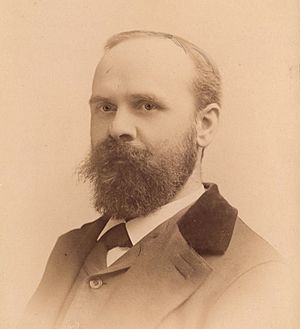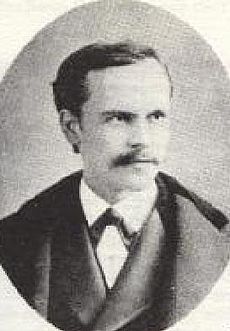Benjamin Tucker facts for kids
Quick facts for kids
Benjamin Tucker
|
|
|---|---|
 |
|
| Born |
Benjamin Ricketson Tucker
April 17, 1854 South Dartmouth, Massachusetts, United States
|
| Died | June 22, 1939 (aged 85) |
| Era | Modern philosophy
|
| Region | Western philosophy |
| School | Anarchism Individualist anarchism Libertarian socialism Mutualism Socialism |
|
Main interests
|
Politics, economics |
| Signature | |
Benjamin Ricketson Tucker (/ˈtʌkər/; April 17, 1854 – June 22, 1939) was an American writer, editor, and publisher. He was a leading thinker in a political idea called individualist anarchism. This idea focuses on the freedom of each person.
Tucker published a famous magazine called Liberty from 1881 to 1908. In this magazine, he shared his ideas about how society should work. He believed in a type of socialism that supported free markets, which he called "anarchistic socialism." He also thought that people should be free from government control.
About Benjamin Tucker
Early Life and His Magazine
Benjamin Ricketson Tucker was born on April 17, 1854, in South Dartmouth, Massachusetts. His family were Quakers. He became interested in political ideas at a young age.
In 1876, when he was 22, Tucker helped publish an English translation of a book by Pierre-Joseph Proudhon. This book was called What is Property?.
From 1881 to 1908, Tucker published his own magazine, Liberty. Many people consider it one of the best magazines about individualist anarchism in English. The magazine helped shape and spread the ideas of individual freedom. It featured essays and debates from many writers, including Tucker himself.
Later Years and Retirement
After moving his magazine to New York in 1892, Tucker opened a book shop in 1906. This shop promoted ideas about individual freedom and art.
In 1908, a fire destroyed Tucker's printing equipment and his large collection of books. Because he did not have insurance, he lost everything. Soon after, Tucker closed Liberty and his book shop. He then moved to France with his partner, Pearl Johnson, and their daughter, Oriole Tucker.
Later in his life, Tucker became less hopeful about the future of anarchism. He passed away in Monaco on June 22, 1939.
Benjamin Tucker's Ideas
What is Anarchism?
Tucker said he became an anarchist at age 18. Anarchism is a political idea that believes in societies without government rule. Tucker's type of anarchism focused on the freedom of each person. This is called individualist anarchism.
He published the first English translation of a book called The Ego and Its Own by Max Stirner. Tucker was very proud of this work. He also translated another important book, God and the State by Mikhail Bakunin.
Tucker believed that "socialism" meant that workers should control what they produce. He saw his ideas as a form of socialism that did not rely on the state. He thought that both state socialism (where the government controls everything) and his "anarchistic socialism" shared the idea that labor creates value.
A Society Without Government
Tucker did not believe in government ownership of businesses. He thought that government control was a harmful type of monopoly. He said that governments are "wasteful, careless, clumsy, and short-sighted."
He believed that force should not be used to make people do things. Tucker did not support violent revolutions to overthrow the government. Instead, he thought that people should learn about freedom and use peaceful resistance. This could include refusing to pay taxes or serve in the military. He believed that if enough people did this, individual freedom would naturally follow.
In Tucker's ideal society, people would work together freely. They would produce and share goods based on their actual cost, not for profit. He imagined a society where everyone earned the full value of their work.
Workers' Rights and Unions
Tucker supported workers' rights. He believed that workers should be paid fairly for their labor. He thought that strikes could be a good way for workers to show their power and demand their rights. He said that "almost every strike is just" because workers deserve to have all that their labor creates.
However, he did not like laws that forced businesses to pay a minimum wage or provide insurance. He thought these things should be decided by free agreements between people.
Private Security
Tucker did not think that a society without government would be perfect. He believed that people would still need ways to protect themselves and their property. He suggested that private companies could offer security services. He saw defense as a service, like any other, that people could choose to buy.
He said that anarchism "does not exclude prisons, officials, military, or other symbols of force." Instead, it means that innocent people should not be harmed by force. Force should only be used against those who truly invade others' rights.
Four Monopolies
Tucker believed that the problems faced by American workers came from four main "legal monopolies" created by the government:
- Money Monopoly: The government controls who can create money and offer banking services.
- Land Monopoly: The government gives special rights to land owners, even if they are not using the land.
- Tariffs: Taxes on goods from other countries, which make foreign goods more expensive.
- Patents: Laws that give inventors exclusive rights to their inventions for a period of time.
Tucker argued that these monopolies allowed some people to get rich unfairly. He thought that if these monopolies were removed, everyone would be able to earn a fair wage for their work.
He believed that charging interest on loans or making a profit from capital was a form of exploitation. He called this "usury." He thought it was only possible because of the banking monopoly.
Land Ownership
Tucker believed that people should only have the right to land they actually use. If someone was not using land, he thought they should not have exclusive rights to it. He said that property rights should only protect things that human labor has created.
Money and Banking
Tucker wanted to end the government's control over banking. He thought that if anyone could start a bank, competition would lower interest rates. This would make it easier for people to start businesses and create jobs. He believed this would lead to higher wages for workers.
Tariffs and Patents
Tucker was against tariffs because they made prices higher. He thought that free trade with other countries would keep prices low. This would help workers get more for their money.
He also did not believe in patents or copyrights. He argued that ideas are not like physical objects. Many people can use an idea at the same time without taking it away from anyone else. So, he thought ideas should not be owned or restricted.
Later Ideas on Egoism
Later in his life, Tucker changed some of his views. He became a follower of Max Stirner's idea of egoist anarchism. This idea suggests that people act based on their own self-interest, not on moral rights.
Tucker then said that there were only two rights: "the right of might" (meaning power) and "the right of contract" (meaning agreements). He believed that rights only exist when people agree to them through contracts. This led to some controversial ideas, such as his view that infants had no rights because they could not make contracts.
However, Tucker still believed that people would find it in their best interest to agree to rules like "equal liberty" and "occupancy and use" for land. These rules would help people live together peacefully.
Tucker's Impact
Tucker's ideas were influenced by many thinkers, including Pierre-Joseph Proudhon and Max Stirner. In turn, Tucker influenced many other thinkers and the broader libertarianism movement. His writings helped shape both left-libertarian and right-libertarian political ideas in the United States.
Many people see Tucker as someone who was against both government control and unfair economic systems. He believed in free markets but was against capitalism as it existed, because he thought it relied on government-supported monopolies that allowed owners to exploit workers. He often called his philosophy "Anarchistic socialism."
Images for kids
See also
 In Spanish: Benjamin Tucker para niños
In Spanish: Benjamin Tucker para niños





